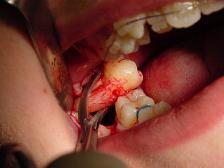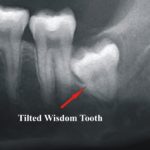ORAL SURGERY
 Sometimes trauma, gum disease, cracked or broken teeth and tooth decay are too significant, and despite our best efforts to save the tooth, extraction may be the only option. Reasons for tooth extraction also include orthodontic spacing needs. We utilize necessary anesthesia procedure to ensure minimal discomfort and maximum function during recovery. Our Goal has always been to compassionately provide patients with the most comfortable and advanced dental surgery procedures. Immediately after the tooth is removed, a bite pack is used to apply pressure to the tooth socket and stop the bleeding. After the surgery, it is avoided to disturb the blood clot in the socket by not touching the area with a finger or the tongue, by not vigorous rinsing of the mouth and by no strenuous activity. Smoking is also prohibited for at least 24 hours as it impairs wound healing. A warm salt water mouth baths which start 24 hours after the extraction is suggested.
Sometimes trauma, gum disease, cracked or broken teeth and tooth decay are too significant, and despite our best efforts to save the tooth, extraction may be the only option. Reasons for tooth extraction also include orthodontic spacing needs. We utilize necessary anesthesia procedure to ensure minimal discomfort and maximum function during recovery. Our Goal has always been to compassionately provide patients with the most comfortable and advanced dental surgery procedures. Immediately after the tooth is removed, a bite pack is used to apply pressure to the tooth socket and stop the bleeding. After the surgery, it is avoided to disturb the blood clot in the socket by not touching the area with a finger or the tongue, by not vigorous rinsing of the mouth and by no strenuous activity. Smoking is also prohibited for at least 24 hours as it impairs wound healing. A warm salt water mouth baths which start 24 hours after the extraction is suggested.
We perform extraction of wisdom  teeth for selected cases on an urgent basis. Wisdom teeth, unfortunately, don’t provide wisdom. Instead, they often cause problems in adolescents and young adults. Most people simply don’t have enough room to accommodate third molars. As a result, wisdom teeth often become encased in gum or bone tissue, which causes pain and pressure. Infection may also occur, which can damage the jawbone and adjacent teeth. In rare circumstances, wisdom teeth develop into cysts or tumors that create a larger problem and require more extensive surgery. If wisdom teeth erupt, they typically crowd neighbor teeth. Crowding increases the risk of gum disease and tooth decay. Wisdom teeth removal minimizes infection and inflammation. Oral infection and inflammation are the starting points of serious problems. Wisdom teeth removal now means no problems in the future.
teeth for selected cases on an urgent basis. Wisdom teeth, unfortunately, don’t provide wisdom. Instead, they often cause problems in adolescents and young adults. Most people simply don’t have enough room to accommodate third molars. As a result, wisdom teeth often become encased in gum or bone tissue, which causes pain and pressure. Infection may also occur, which can damage the jawbone and adjacent teeth. In rare circumstances, wisdom teeth develop into cysts or tumors that create a larger problem and require more extensive surgery. If wisdom teeth erupt, they typically crowd neighbor teeth. Crowding increases the risk of gum disease and tooth decay. Wisdom teeth removal minimizes infection and inflammation. Oral infection and inflammation are the starting points of serious problems. Wisdom teeth removal now means no problems in the future.
